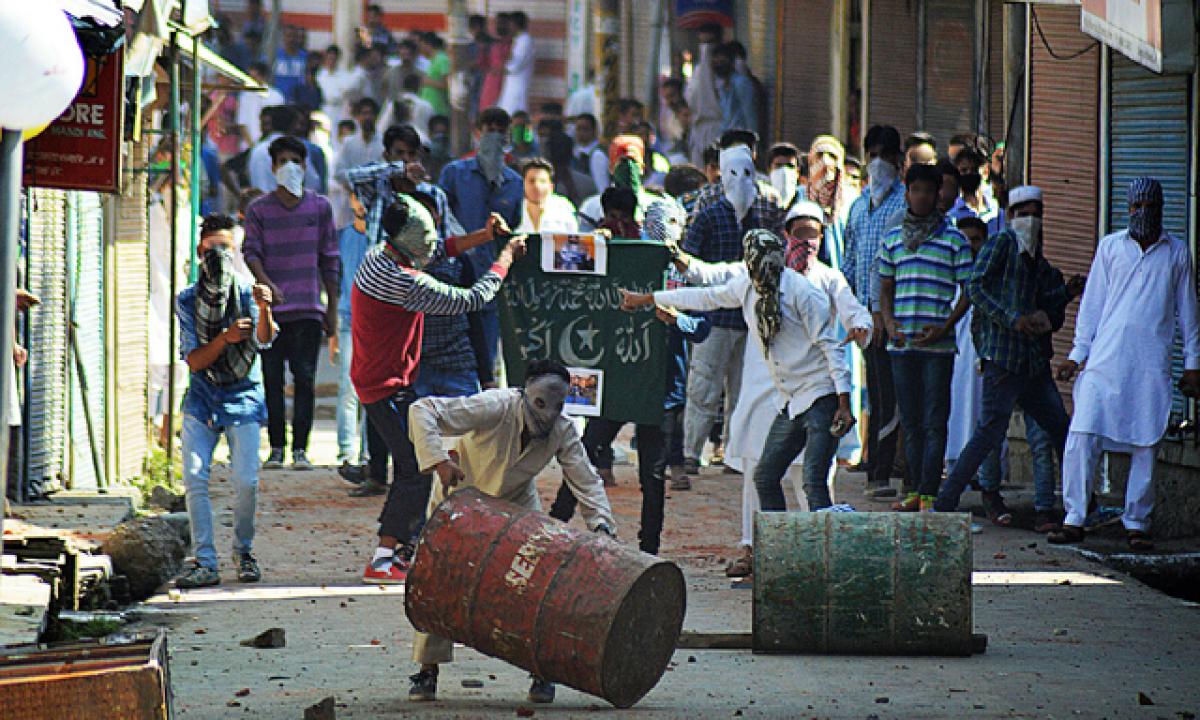Live
- Chanchalguda Jail Officials Say They Haven't Received Bail Papers Yet, Allu Arjun May Stay in Jail Tonight
- BJP leaders present evidence of illegal voters in Delhi, urge EC for swift action
- Exams will not be cancelled: BPSC chairman
- Nagesh Trophy: Karnataka, T.N win in Group A; Bihar, Rajasthan triumph in Group B
- YS Jagan condemns the arrest of Allu Arjun
- Economic and digital corridors to maritime connectivity, India and Italy building vision for future, says Italian Ambassador
- SMAT 2024: Patidar's heroics guide Madhya Pradesh to final after 13 years
- CCPA issues notices to 17 entities for violating direct selling rules
- Mamata expresses satisfaction over speedy conviction in minor girl rape-murder case
- Transparent Survey Process for Indiramma Housing Scheme Directed by District Collector
Just In

In this age of bloody bomb attacks on soft targets ranging from wedding parties in Turkey to tourist towns in Thailand, the turmoil in Kashmir is a ticking bomb the Indian government cannot afford to avert its gaze from, even if the international community thinks this is none of its business.
In this age of bloody bomb attacks on soft targets ranging from wedding parties in Turkey to tourist towns in Thailand, the turmoil in Kashmir is a ticking bomb the Indian government cannot afford to avert its gaze from, even if the international community thinks this is none of its business.
As parts of the valley remain curfew-bound more than a month after the killing of Hizbul Mujahedeen commander Burhan Wani on July 8, reports of severe pellet injuries to eyes and deaths of civilians in clashes with security personnel have been jostling for attention internationally with news from Middle East war zones.
That India has been spared an al-Qaeda or Islamic State-inspired attack so far is hardly a signal that the danger has passed, given the pervasive use of themes of Sunni Muslim suffering and victimhood in transnational terrorist propaganda. For better or worse, the ferment in Kashmir has provided fresh proof that the desire for self-determination and sense of alienation among the valley's Muslims greatly outweigh their periodic infatuation with the ballot box.
Under the circumstances, there are broadly two possible scenarios that do not entail moral compromises that could undermine India's democratic reputation in the eyes of the world: First, to win the war of ideas by promising the youth of Kashmir a bright future as fellow Indians within the current arrangement of autonomy; Second, to initiate a civil dialogue in good faith with all the stakeholders in the Kashmir dispute.
The second scenario may seem premature and, as yet, unthinkable to a majority of Indians, who have valid reasons to worry about national security were the strategic region to be granted the freedom to turn potentially into another difficult neighbour. But the first scenario, for its part, begs the big question as to whether our messy, secular democracy, led at present by an avowedly Hindu nationalist party, can really offer Kashmir's Muslim population a road-map of hope so that they may be, just may be, persuaded to stay within the union in the theoretical instance of a referendum.
The answer is a heavily qualified yes. But how?
By demonstrating that India is ready to embrace all the values of modernity: respect for civil rights; free speech and regulated markets; sustainable development; equal-opportunity policies; bureaucratic efficiency and accountability; religious tolerance and secularism; civic discipline; and 21st century global social norms. Swift delivery of justice, fair enforcement of law and merit-based hiring policies should ideally complete the picture of India's transformation.
India must embrace these values not merely to win the hearts and minds of young Kashmiris but all Indians, be they privileged caste or backward caste, young or old, male or transgender, Muslim or Zoroastrian, Malayali or Assamese. To be sure, this would be a challenge of mind-boggling complexity.
There is a lot of blame to go around for the present state of affairs, and it is tempting to put all of it on our politicians in general and one man, Narendra Modi, in particular. But as the old saw goes, in a democracy people get the leaders they deserve. None of this guarantees that in the end Kashmiri Muslims will give up their demand for azadi and throw in their lot with a transformed India generous, disciplined, self-confident and sophisticated. We can cross that bridge when we come to it. But we need to begin the long journey of self-searching and self-improvement, today. The clock is furiously ticking.
By Arnab N Sengupta

© 2024 Hyderabad Media House Limited/The Hans India. All rights reserved. Powered by hocalwire.com







